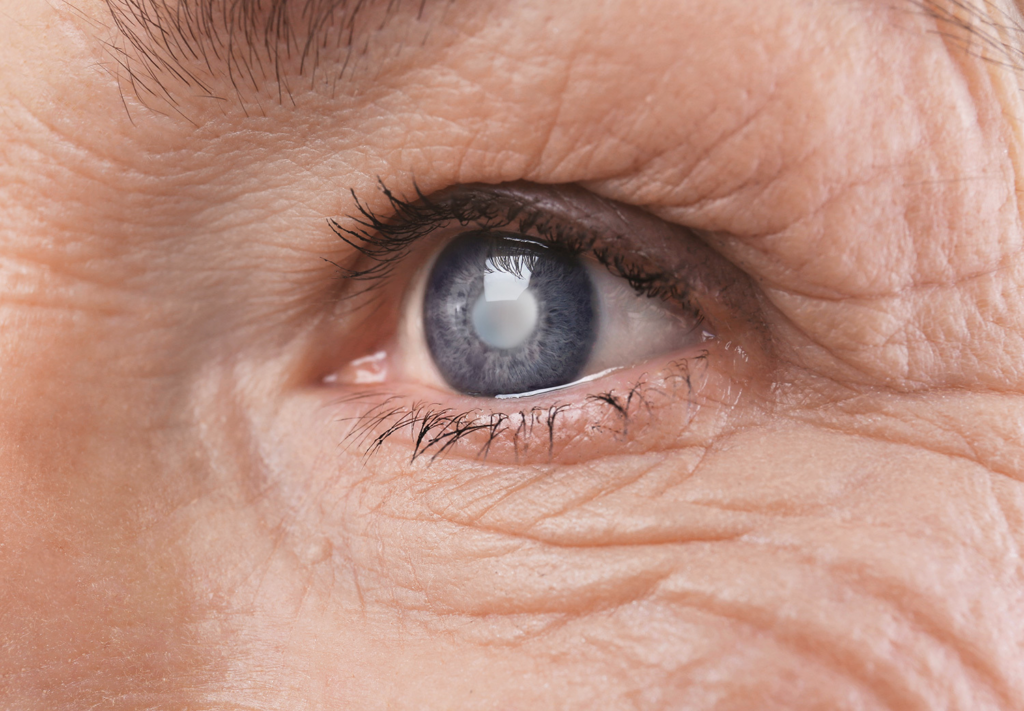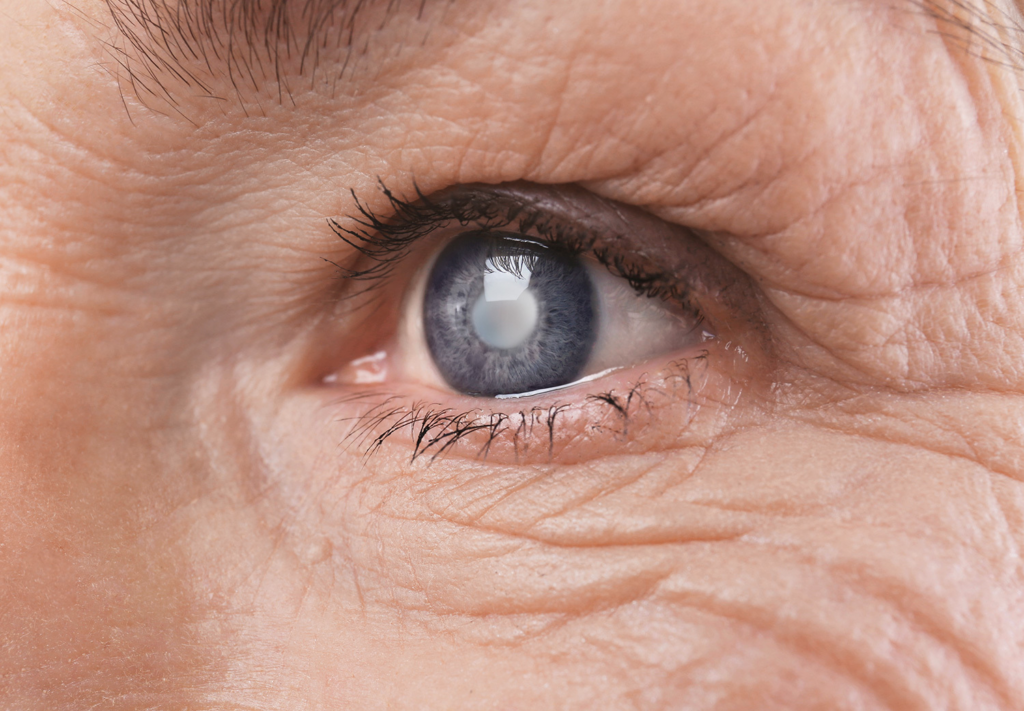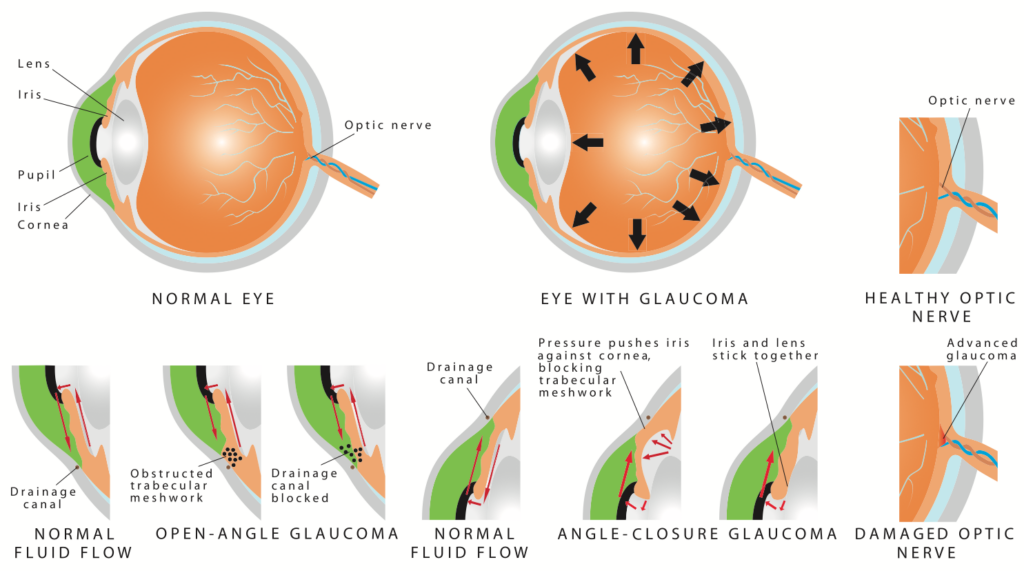
Glaucoma is the second-leading disease causing blindness in more than 3 million Americans. 90% of whom are 40 years and older. Not only does this disease affect people physically, but there are many side effects that alter the emotions and mental stability of patients living with glaucoma.
There are two main types of glaucoma and a third one that is less common: open-angle–being the most common– and angle-closure, both acute and chronic conditions, and congenital. We just took the month of January to participate in National Glaucoma Awareness month. Today we’ll talk more about the symptoms associated, hear patient’s stories of their experience with glaucoma, and answer the questions you may have about it.
Vision First wants to inform our patients of common eye diseases to promote better eye care and remind you not to neglect regular eye exams to prevent foreseeable diseases and eye damage such as glaucoma.

Symptoms of Glaucoma
Most people who develop open-angle glaucoma don’t experience any noticeable symptoms at first. That’s why it’s imperative to have regular eye exams, to detect problems early on.
Symptoms of Open-Angle Glaucoma:
- Gradual loss of peripheral vision, usually in both eyes
- Tunnel vision in the advanced stages
The progression of this type of glaucoma can be slow, but the effects can be devastating on your long-term eyesight.
Symptoms of Acute Angle-Closure Glaucoma (1):
Acute angle-closure glaucoma is a medical emergency and must be treated immediately or blindness could result in 24-48 hours. This type is the more serious and can potentially cause permanent eye damage if not treated properly and quickly.
Acute angle-closure glaucoma signs and symptoms include:
- Severe eye pain
- Blurred vision
- Sudden onset of visual disturbance, often in low light
- Nausea and vomiting (accompanying the severe eye pain)
- Halos around lights
- Reddening of the eye
Symptoms of Chronic Angle-Closure Glaucoma (2):
Similarly to open-angle glaucoma, this type of glaucoma progresses more slowly and can damage the optic nerve without symptoms.
People with this type of glaucoma will not experience any symptoms until they begin to lose peripheral vision.
Symptoms of Congenital Glaucoma:
Congenital Glaucoma occurs mostly in children who are born with an eye defect, slowing the drainage of fluid to and from the eye.
Symptoms of Congenital Glaucoma include:
- Light sensitivity
- Foggy/cloudy vision
- Tearing of the eye
Medicine is not usually prescribed to children with congenital glaucoma. Surgery is the recommended option for safe and effective recovery and treatment.

Hear the Stories of People Living With Glaucoma
- Judy Huang
“I was first diagnosed with glaucoma through my regular eye doctor. I’ve been nearsighted pretty much all my life. I moved back to the States from Asia in the early 2000’s. So, I had an appointment with [my eye doctor], and he thought that I had a little bit of a high pressure. So that’s when he referred me to a specialist, and by that time they actually found that I’ve had pretty progressive glaucoma in my right eye – a little bit less on the left. Since then, I’ve been on drops, I’ve been on SLT (laser treatment to lower eye pressure), and within the last six months is when I’ve had two surgeries in my eye. Glaucoma has affected my eyes, initially, very minimally I would say. I haven’t lost enough sight to really notice. But through probably the last two or three years, I’ve had more progressive loss, and that’s when my doctor pushes me for this surgery.I think what I’ve found is that sight is such an important thing that we don’t know that we have until we lose it. And through loss of sight, I try to pay attention to everything that I see – really to treasure everything that we see, versus focusing on the loss, and obviously trying to adjust to the loss.You have a lot of fear about anything that’s a surgery touching your eyes, so therefore you prolong that inevitability of having surgery. So, I really feel that one thing I would like to share with others is to look for more aggressive means of stopping the progression of your glaucoma earlier on, especially if you’re earlier in your lifespan when you have glaucoma. That’s what I’d like to share.” (Source: https://www.glaucoma.org/personal-stories/judy-huang-my-glaucoma-story.php)
- Amanda Eddy
“Many people think it’s a disease that just affects elderly people, especially with being born with it and living with it my whole life, people are like, “You have glaucoma…?,” Amanda said.
Amanda was born with glaucoma, after her father had the disease and went blind at an early age. She had two surgeries early in life to help with her symptoms and began a regimen of twice daily eye drops to ease the pain of her glaucoma. She has continued regular doctor visits every few months to maintain proper care for her eyes and check the status of her condition.
Due to her early detection and continued care over her lifetime, Amanda has not lost any vision, which is a wonderful miracle! Two years ago, she experienced a scare and had to undergo two back-to-back surgeries. The doctors detected that she needed these procedures, but without her regular visits, this may have gone unseen.
Since her surgery, her eyesight has remained stable and she continues to see her eye doctor regularly.
“It’s crazy, because you can’t feel it. you can’t tell if your pressure’s getting high or low. It’s just there, and so you don’t know until you go in for that pressure check. I don’t know if anybody else has ever told you, but it’s so scary. Even to this day, I’ve been doing this 36 years, and every pressure check, I just freeze up. I’m like oh, please don’t be high, just because that means horrible things. That’s kind of my journey with it now, but I feel incredibly lucky and blessed that I still have my sight, and hopefully I will for a long time.” (Source: https://www.glaucoma.org/personal-stories/personal-story-amanda-eddy.php)
Is Glaucoma Treatable? Or Curable?
The treatment for glaucoma depends upon the nature and severity of each case and type. Glaucoma cannot be cured, but the symptoms can be controlled and regulated. Treatments and medications such as eye drops, pills, laser procedures, and surgical operations are used to prevent or slow further damage. With any type of glaucoma, regular eye examinations are very important to detect progression and to prevent vision loss or blindness. Glaucoma can worsen without the patient even knowing, so your treatment will likely need to be altered over time to achieve a lower target eye pressure and fit your unique eye needs for your type of glaucoma.
Ultimately, we want everyone to know there’s hope for people with Glaucoma. Awareness and proactive care is key. At VisionFirst, we always recommend visiting our certified, trusted team of doctors for annual eye exams, which can detect early warning signs and symptoms of glaucoma or any other eye diseases. Contact us now to schedule an appointment. Feel free to ask about one of our 5 glaucoma screenings.
